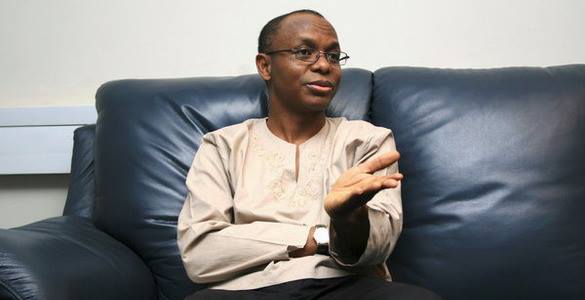
Profiling Gubernatorial Aspirants of Kaduna State: MALAM NASIR AHMED EL-RUFAI
Nasir El-Rufai was born on 16th February, 1960 in Daudawa of Faskari Local Government Area in Katsina State. Despite his northern upbringing, Nasir El-Rufai has always said he is “Nigerian” first before being “Hausa”.His father who lived on a pension of three pounds a month died while the young Nasir was 8.He was sponsored throughout his schooling days by an uncle in Kaduna, and as a result grew up in the influential Northern state.He went to secondary school in the prestigious Barewa College, where he graduated at the top of the class, winning the coveted “Barewa Old Boys’ Association Academic Achievement” Trophy in 1976. Incidentally, in Barewa College, the former President Umaru Yar’Adua was the House Captain of Mallam Smith House which was Nasir’s dormitory as a junior. He went off to Ahmadu Bello University, Zaria, earning a Bachelor in Quantity Surveying degree with First Class Honors. He also attended post-graduate programs at Harvard Business School and Georgetown University.[15] Since leaving public service, Nasir has completed an LL.B degree from the University of London, graduating in August 2008 with Second Class Honors, Upper Division, and a Master’s Degree in Public Administration from the John F. Kennedy School of Government, Harvard University in June 2009. He also received the Kennedy School Certificate in Public Policy and Management having been spent 11 months as an Edward A. Mason Fellow in Public Policy and Management from July 2008 to June 2009.
Nasir established a Quantity Surveying and Project Management Consulting firm in 1982 with three other partners. The firm was quite successful, handling man building and civil engineering projects in Nigeria, and made the partners wealthy millionaires while still in their twenties. From November 1999 to July 2003, he was the Director General of the Bureau of Public Enterprises and the Secretary of the National Council of Privatization where he spearheaded the privatisation of many government owned companies alongside the controversial former Vice-President. El-Rufai is a known crusader against corruption, having previously successfully exposed two senators that demanded bribes from him to ease his ministerial confirmation. He presided over a real estate boom backed by the radical transformation of infrastructure and land use practices of the federal capital earlier riddled with corruption and vast deviation from the original masterplan. With the establishment of the Abuja Geographic Information System within 12 months of being Minister of the FCT, Abuja became the first municipality in Nigeria with a computerised land register and information system. Along with the President and members of the Economic Management Team, he led the reform of the Nigerian public service which had become dysfunctional during years of military dictatorship. At various times during his tenure as Minister, he oversaw the Federal Ministries of Commerce (twice) and Interior. He also chaired several high-profile cabinet committees that led to the establishment of a mortgage system in Nigeria, National ID card system for Nigeria, Electric Power Supply Improvement and the sale of Federal Government real estate in Abuja.
During the last days of the Obasanjo administration, many described El-Rufai as the “de facto No. 2 official”, tagging him with the role of a Vice-President, especially after the fall-out between the former President and his Vice-President. It is believed that Obasanjo’s trust and confidence in El-Rufai angered a vast number of the political elite within the country. Indeed, it was widely believed that the former President was considering blessing El-Rufai as his successor. However, it was believed the vast political powers against him were too much, probably as a result of the fear of what may happen to them once he was in power.
Many view El-Rufai as an incorruptible public servant who can get difficult jobs done, especially after he ordered the demolition of the house of the Chairman of the ruling party in Nigeria. The administration of the President, Umaru Yar’adua appointed El-Rufai to the National Energy Council in September 2007, due to the belief that he could contribute positively to the under-achieving power sector of the country. Nasir resigned the appointment in June 2008.
Nasir in 2009 published a widely circulating essay on then President Umaru Yar’Adua titled “Umaru Yar’Adua – Great Expectations, Disappointing Outcomes” which for the first time revealed aspects of the president’s life history, habits and statecraft, as well as the performance (or lack of it) of the administration. The essay has become a reference point for evaluating the Yar’Adua Administration. The essay has been serialised in several Nigerian newspapers and available on various new sites and blogs. EL-Rufai has had various nicknames throughout his period in politics and even before that, he’s knowns as Giant in Barewa College Zaria by those close to him, a reference to his small size. He is also known as the Privatization Czar, and more recently as Mr. Demolition.
He dumped the ruling Peoples Democratic Party (PDP) for Congress for Progressive Change (CPC) and now part of the parties that metamorphosed into All Progressive Congress (APC) in which he is the Deputy National Secretary.
Nasir is fearless, courageous and very intelligent. And has a vast national and international link than any other contender of Sir Kashim Ibrahim House in 2015. He is also the leading Nigerian politician with social media follower ship and activeness.


Recent Comments